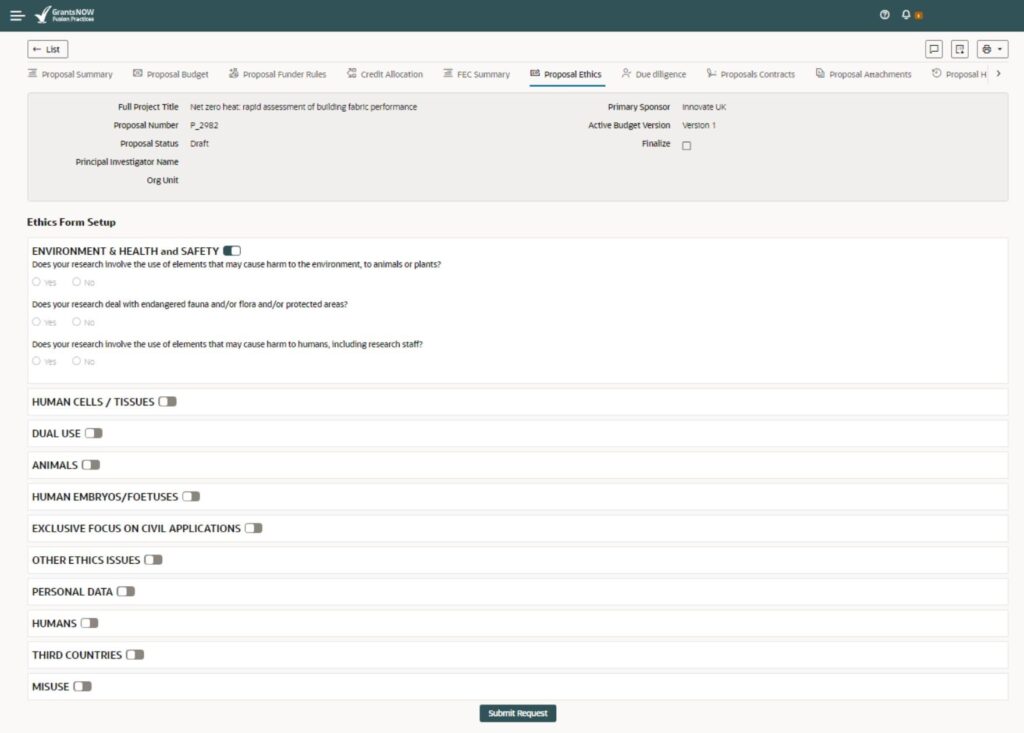Research Ethics and Integrity – how are you tackling this highly important area?
Author: Dr Paul Roberts
A key part of the development of our GrantsNow product is to monitor key trends and challenges across the UK Research and Innovation Environment. This week we consider the implications for Research and Enterprise Divisions in relation to research ethics and integrity and provide some practical guidance on how to respond. The GrantsNow platform already includes functionality for Ethics & Due Diligence and below are observations on these topics.
The expectations and requirements on UK higher education institutions to ensure their research environments operate to the highest standards of research ethics and integrity continue to grow. Sir Paul Nurse’s Independent Review of the research, development and innovation (RDI) organisational landscape of the UK commissioned by the UK Government’s Secretary of State for Business, Energy and Industrial Strategy (BEIS) was clear on the need for ‘a good research culture embracing ethical behaviour’ (Nurse, 2023:7). The report went on to stress that,
“Quality RDI can only be delivered if it is based on a good scientific culture with a focus on integrity and ethical behaviours, which produces long-term verifiable and trustworthy knowledge and increases the general public’s trust in the scientific endeavour” (Nurse, 2023:31)
This theme was further reinforced last week with the House of Commons Science and Technology Committee’s report on “Reproducibility and Research Integrity’. The clear recommendations mean that UK higher education institutions need to be increasingly mindful of research ethics and integrity. Issues can arise from all research disciplines (not just the historical focus on research with humans) and there is a growing need to address research ethics and integrity through every phase of research from conception to dissemination and impact.

In short, the GrantsNow team expects requirements and data around research ethics and integrity will continue to grow for UK higher education institutions. To navigate this growth university staff in policy and management roles, alongside chairs and members of research ethics and integrity committees will need to rely on a plethora of processes and procedures.
“The establishment and maintenance of well-founded ethics support processes to aid researchers is a key role for research organisations to fulfil.” (UKRIO & ARMA, 2020)
So is it time to review your research ethics and integrity processes? Is your institutions ready to adapt to new research ethics and integrity requirements? Are your systems and processes flexible enough? Can they be easily configured and reconfigured?
If you think you are due a review of your existing research ethics and integrity environment. Here are seven simple ’s’s (adapted from the McKinsey 7s model) to help you think about your institutional practice on research ethics and integrity. Are these seven elements effectively aligned with each other in your organisation? What are the gaps, inconsistencies and weakness between the elements?
Seek – Have you sought out the latest guidance that is available? Are you engaging with the UK’s Research Integrity Office (UKRIO)? It’s not too late to register for the UKRIO Annual Virtual Conference 2023! Have you read the recommendations produced by the Association of Research Managers and Administrators (ARMA) and UKIRO? See references below for a start!
Share – Have you shared the rise in expectations around research ethics and research integrity within your institution? Do colleagues know the new norms and standards they should be working to? Have you shared your concerns with peers? What mechanisms do you have to discuss changes and practice with other higher education institutions?
Staff – Are there sufficient staff to manage the increasing demands related to research ethics and integrity? What are the time-consuming administrative aspects that need to be changed?
Skills – What are the skills and abilities needed by staff in policy and management roles? How are they being supported and developed?
Structure – Do you have the right structure, not just in terms line management of staff but also in terms of governance?
Systems – Finally have you invested in the right systems, which can be adapted to changes in policy as well as the structures and decision-making processes within your own institution? The GrantsNow team are particularly interested in your views on systems for Research Ethics and Integrity having developed an Ethics module to facilitate workflows, record keeping, and an audit trail. If you are interested in attending our workshop on this topic please sign up here.
We look forward to hearing your views and best wishes for those attending the UKRIO conference.


